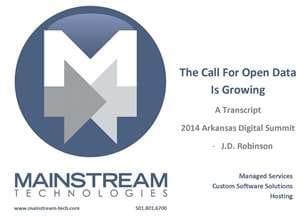This article is a summary of the Open Data Seminar presented by JD Robinson, Mainstream Technologies at the 2014 Arkansas Digital Government Summit, November 5, 2014.
 INTRODUCTION
INTRODUCTION
What do we mean by OPEN DATA? Open data is information that is free to use and distribute without any restrictions. There are at least four reasons why public policymakers are considering implementing open data policies:
Today, the transparency of government is a growing topic. There’s interest around the country to keep the public informed about what our federal, state and local governments are doing. We have a thirst to know what’s going on and to be honest, the public’s distrust of government is a contributing factor. Increasing transparency by opening up data sets is a way to address public concerns and increase trust.
Open data offers the potential to increase participation in government. More access to government information serves us all. This knowledge encourages thoughtful and informed policy discussions with the hope that together we can improve the efficiency and effectiveness of government services.
Open data can assist with measuring policy effectiveness. Open data offers the promise of providing a way to measure policy effectiveness across the agencies who share responsibility for executing or implementing a policy.
New knowledge can be created from combined data sources which can reveal a more complete and holistic view of an issue. New knowledge will be helpful in addressing the more complex issues we’re facing as a state.[1]
HOW TO GET STARTED?
Once an agreement is reached that open data is the right course of action to take, it will be necessary to establish common standards so the published information from various agencies is in standardized formats that can be easily consumed and merged with other data sources.
The Transparency Act of 2011 is a great example.[2] It told us exactly what to do and how to do it. That legislation can be used as a starting point for creating additional open data policies.
Even though the thought of open data is daunting, starting small and tempering expectations from the outset will increase the chances for success.
The first step is either to identify a single, small data set or look at Freedom of Information requests as possible starting points.
One agency we’re aware of receives the same FOI request on an almost weekly basis. Now, when they receive the request, they initiate a manual process because of the way the data is stored. They assemble the raw data and must filter out the unnecessary information to deliver it within the 72-hour window. It’s a very labor-intensive process. Automating and publishing this one FOI request would help them be more efficient, saving both time and money. Small wins like this can add up and pay off big down the road.
PITFALLS
There are some pitfalls to implementing open data across the board. The main one that everyone is and should be concerned with is privacy. More datasets being made publicly available increases the possibility that unintended correlations can be drawn and personally identifiable information can unintentionally be exposed.
How to start is another issue. Even if everyone agrees that open data is something that needs to be done it’s just too much to bite off all at once. Where do you start? Who has the skills to pull it off? Who has the knowledge to make sure the initiative is progressing at an acceptable rate?
Standardization is essential. In order for open data to thrive, guidelines and common standards must be established by policymakers so that our agencies can manage to common objectives.
CONCLUSION
Information is power. New knowledge can help meet both the challenges facing us today as well as preparing us for tomorrow’s challenges.
ABOUT THE AUTHOR
JD Robinson is a Software Architect with Mainstream Technologies. To contact JD by phone, 501.801.6700 or via the web @ www.mainstream-tech.com.
ABOUT MAINSTREAM TECHNOLOGIES
Mainstream Technologies is one of the fastest growing technology firms in the Mid-South, serving clients from its headquarters in Little Rock, AR. Mainstream has offices in Little Rock, Conway, and Bentonville. It is currently ranked among the top 10 of all privately held Arkansas companies on the Inc. 5000 annual growth list. Its staff of 60+ serves business and government customers across the nation with Managed Services, Custom Software Solutions and Hosting services from its downtown Little Rock office.
[1] Open Knowledge Foundation, http://opendatahandbook.org/en/why-open-data/index.html
[2] http://transparency.arkansas.gov/Documents/Act303.pdf






